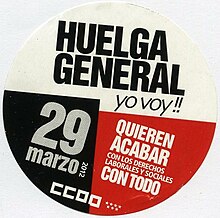General strike
A general strike or general strike is a strike that simultaneously affects all work activities.
The general strike is called by the trade union movement —unions and labor centrals and directed at all workers—. The call and participation in the general strike can be addressed exclusively to the working class or be broader and affect other sectors and social organizations such as students, unemployed or unemployed, retirees, being able to receive support from non-traditional sectors of the labor movement when the demands affect to the entire social group: economic reconversions, industrial reconversion, relocation of companies, depressions, economic and financial crises.
History
The first to theorize about the general strike as a political weapon (he called it the «great national holiday», Gran National Holiday, or «great national holy day», breaking down the word holi-day, 'holy day') was the British radical worker William Benbow in a work published in 1832 under the title The great national holiday and the congress of the producing classes, which soon became one of the most widely distributed writings of early English socialism and a reference work for the Chartist movement, in which Benbow was an active participant.
At the end of the 19th century, the increasingly influential international labor movements advocated the general strike for industrial and political purposes.
Generally in Europe, during the 19th century, the general strike was used to demand political rights (universal suffrage) or social rights (social legislation and legal recognition of labor organizations). Within the political left, the general strike was also considered as the element that would initiate the social revolution, by paralyzing the activity of the State and implementing workers' control of production and state administration. Georges Sorel was the main theoretician of this form of action. In Reflections on Violence (1908), noting that the myth of the general strike serves to reinforce solidarity, class consciousness and the revolutionary spirit in the working class.
During the first two centuries of the Industrial Revolution, however, labor strikes were severely punished, and it was not until the spread of social democracy at the beginning of the 20th century that the right to strike was internationally recognized as an essential right of workers constituting freedom of association. This is one of the second generation rights, which is currently recognized in most domestic legal systems and in international treaties of universal scope such as the International Covenant on Economic, Social and Cultural Rights. Except for some informal businesses, their absence was notable in the streets, schools, offices, transportation, banks, the media, and other spaces.
Contenido relacionado
Francisco Fruits
Accessibility barriers
The Argañán Hostel
